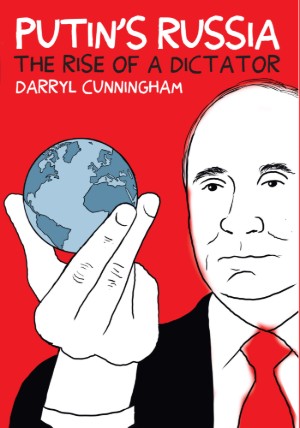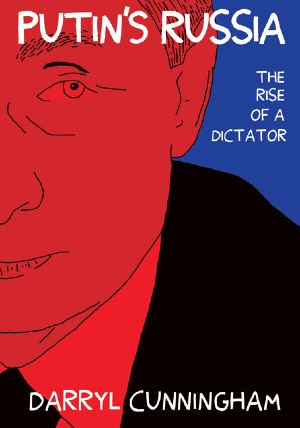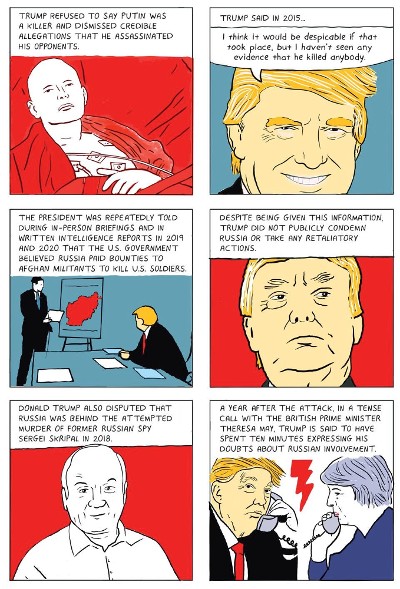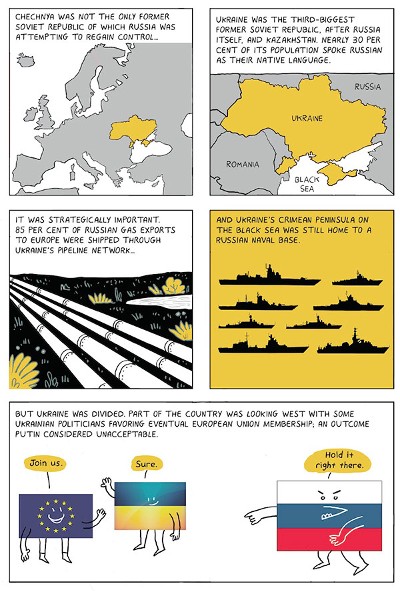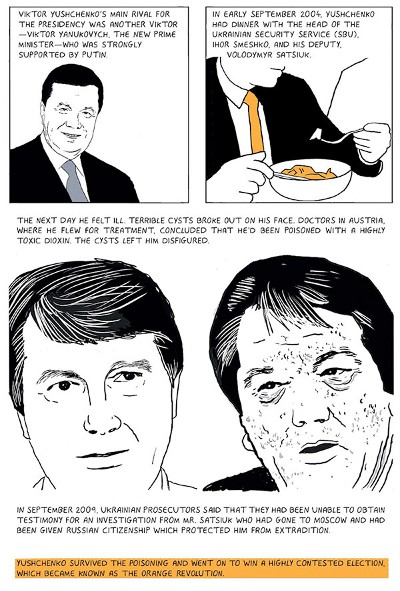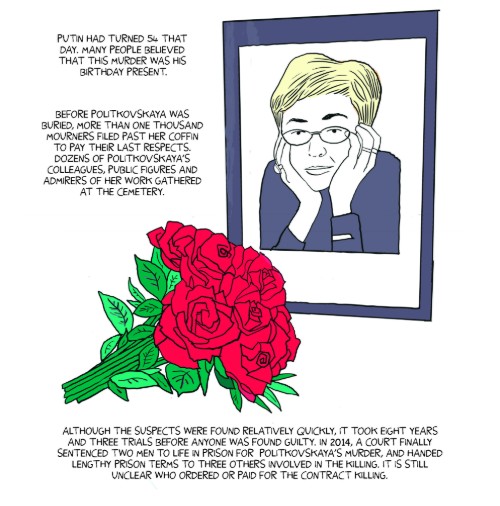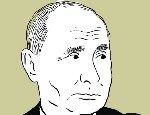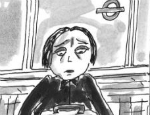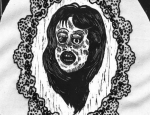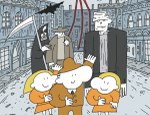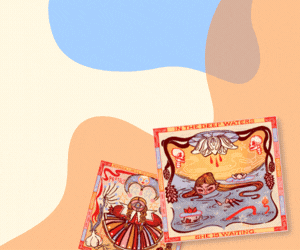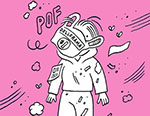To immerse oneself in a book by Darryl Cunningham is the equivalent of signing up for a history lesson by a particularly engaging lecturer. This isn’t only because of his wry manner or humorous art, but because of how lightly he wears his scholarship. There is always an enormous amount of research on display, but it never feels overbearing or pedantic. It is a testament to how carefully he deploys facts and figures, making weighty subjects so much easier to engage with. Cunningham has spent the past few years issuing warnings about how certain aspects of society are being ignored at our peril. His latest book, Putin’s Russia: The Rise of a Dictator, arrives at a crucial time when global powers appear to be pitted against the Russian strongman determined to drag his country into war.
We asked Cunningham about his art, how he chooses a subject, and how hopeful he is of things changing for the better. Here are his responses.
BROKEN FRONTIER: You once described the comic strip format as particularly good at presenting information in a concise and entertaining way. How do you choose the subjects that you believe can benefit from this treatment?
DARRYL CUNNINGHAM: I tend to tackle subjects that are the most prominent in the time that I’m writing: big subjects that are often poorly understood by the general population and badly explained by the media. It’s as much about me wanting to understand the subject as it is about me explaining it to others.
BF: There is no ambivalence in the dire message you leave readers with at the end of Putin’s Russia. What did you take away from Putin’s story on a personal level, while working on research that went back to his fairly humble beginnings?
CUNNINGHAM: The West, by which I mean Western Europe and the US in particular, have badly misunderstood Putin from the beginning. They have treated him as if he was just another statesman and not the ruthless gangster he actually is. Dictators don’t ask whether they can do a thing, they will just do it, and if there is little or no pushback, they will advance further. A lack of consequences early in Putin’s regime has led directly to what’s happening in Ukraine today. The West has been weak and the Kremlin has taken full advantage of this.
BF: There are multiple players in Putin’s Russia, and it is presumably hard to differentiate them as an artist even though some are easier to identify than others. What methods do you rely on to make sure readers can track one figure across pages? Do you rely on colour, for instance?
CUNNINGHAM: I find getting likenesses very difficult. It does not come easily to me. I used a lot of photo reference in this book, partly to make sure the reader can tell clearly who’s who, but also to give the book a more documentary feel. I wanted it to feel realistic, so it’s a lot less cartoony than my previous books.
BF: Your Twitter handle is full of retweets promoting other writers and artists. Are there any intriguing new voices you would like to point us towards?
CUNNINGHAM: I’m particularly keen on the work of Keiler Roberts, whose deadpan vignettes of domestic life I find hilarious and charming. Most comics are about action and movement, but Roberts’ work is the antithesis of this. A series of frozen scenes that reveal a human depth not often seen in many mediums, let alone comics.
BF: If one looks at your history as an author, it feels as if you moved from more generalised topics to subjects that, starting with Supercrash/The Age of Selfishness, began to increasingly resemble warnings about society at large. Do you feel that way too?
CUNNINGHAM: I do. I’ve felt the same sense of ongoing crisis that everyone has been feeling and I’ve responded to it in the only way I know, which is to write/draw about the subject, as a way of both understanding the situation, and as a counter to the vast amount of disinformation that’s out there.
BF: There are some overlaps between what you covered in your last book, Billionaires, and how governments like Putin’s work. Is that why you were initially drawn to his story?
CUNNINGHAM: Putin’s Russia: The Rise of a Dictator, is a natural extension of Billionaires. Originally when I was promoting Billionaires (a book about the one per cent), I jokingly kept saying that my next book would be about Putin. This thought was sparked by my reading that Putin is estimated by some to be worth around $20 billion himself, which if so, puts him in the top five wealthiest people on the planet. Putin and his crime cartel have been stealing from the Russian people for over two decades now and have amassed colossal wealth. On thinking about this it was obvious that I would have to tackle this subject too.
BF: There is a sense of helplessness that has only increased since the pandemic, as democracies around the world struggle. How hopeful are you of things changing?
CUNNINGHAM: I swing between hopefulness and despair like most people do. But I’ve lived long enough to see much historical change in my life. As a child, then a teenager, I grew up in a time when situations like the Northern Ireland unrest and South African apartheid seemed intractable. You couldn’t imagine such situations ever changing, and yet they did, and looking back it is clear it was inevitable that this would happen. It’s often really hard to see the present clearly. Yes, anti-democratic and authoritarian forces have been unleashed nearly everywhere, and democracy is under threat in many countries including the UK, but the underlying structures are far stronger than we give them credit for. If this wasn’t the case then [Donald] Trump would still be President of the US and Boris [Johnson] wouldn’t be on the political ropes right now. Have faith. Stay strong. Despair only aids the enemies of democracy. They want us to give up. So don’t.
BF: Could you tell us a little about Far Beyond Midnight, which you describe as a supernatural graphic novel?
CUNNINGHAM: Far Beyond Midnight is my deep dive into the horror genre and first work of fiction for some years. A sort-of supernatural soap opera set in two time periods: 1973 and 1820. This book comes out of my love for old Hammer movies, ghost stories, English folk and military history. I’ve done a lot of research for this book, as I always have, but because it’s fiction I’m not tied to the truth as I usually am. I’m able, if I wish, to make all the details up, which after years of non-fiction work is incredibly freeing, I can tell you.
Putin’s Russia is published by Myriad Editions in the UK and Drawn & Quarterly in North America.
Interview by Lindsay Pereira
This interview was conducted and published prior to the invasion of Ukraine. If you would like to donate to humanitarian causes to support the people of Ukraine there is a list of relevant organisations here on the London Ukrainian Institute website.





